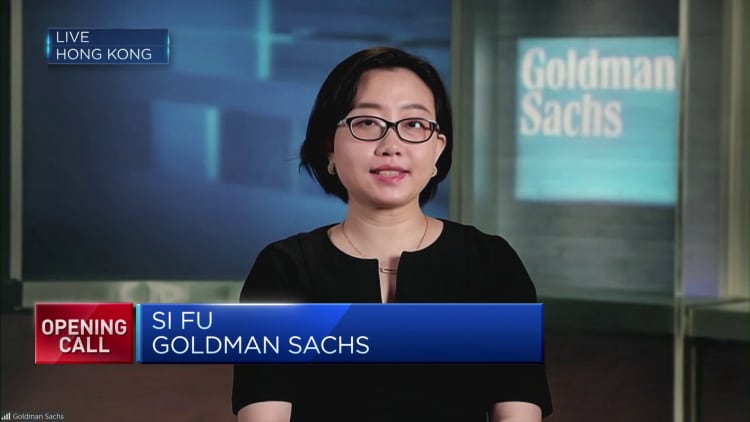China’s former Minister of National Defense Li Shangfu salutes the audience on June 4, 2023.
Roslan Rahman | Afp | Getty Images
The Chinese government removed Gen. Li Shangfu from the post of defense minister and state councilor without appointing a replacement, state media CCTV reported Tuesday.
His dismissal was announced through an order of China’s legislative body, the National People’s Congress. No explanation was given for his removal.
Li, who was appointed to lead China’s Defense Ministry during a broader Cabinet reshuffle in March, has not been seen in public for the past two months, according to Reuters.
Reuters also reported that Li, 65, faced a corruption probe over the procurement of military equipment — which CNBC could not independently confirm. Renown for valuing loyalty, Chinese President Xi Jinping has unleashed a drove of anti-corruption campaigns against all levels of the Chinese Communist Party, targeting both “tigers and flies” — referring to officials both petty and grand.
An aerospace engineer who began his career at China’s Rocket Launch Center, Li had smoothly risen through the ranks, with promotions that included membership of the Central Military Commission — the country’s highest national defense organization — since 2022.
Li is the second high-profile minister from Xi’s administration to be removed amid a storm of speculation. In July, Qin Gang — who was also stripped of his authority as state councilor on Tuesday — was dismissed from his role as foreign minister after a one-month absence.

Li’s and Qin’s dismissals need not necessarily point the compass of Xi’s foreign policy in a fresh direction, but the former defense minister’s successor could ease the path toward diplomacy with the U.S. Li has been under White House sanctions slapped on by the administration of Donald Trump in 2018 in connection with China’s purchase of Russian combat aircraft and equipment. His sanctions have been a bone of contention between Washington and Beijing, with China declining a request for a meeting between him and U.S. Defense Department counterpart Lloyd Austin on the sidelines of the Shangri-La Dialogue security forum in May.
“If the United States says it wants to communicate while suppressing and containing China by any means and imposing sanctions on Chinese officials, institutions and enterprises, what is the sincerity and meaning of such communication?” Chinese Foreign Affairs Ministry spokesperson Mao Ning said in late May at a regular news briefing in Beijing, according to NBC News.
Political rifts between China and the U.S. have deepened in recent years, cresting in a White House initiative to “de-risk” — or minimize — its trade relations with China. Washington has also slapped down increasingly tighter sanctions reining in China’s technology sector since 2019. Earlier in February, the sighting of a Chinese spy balloon across the U.S. led to a major diplomatic incident.
China’s military sector — which will increase defense spending by 7.2% this year, according to the latest national budget — is closely watched by the international community, given mounting tensions with Taiwan in recent years. Beijing considers the independently governed Taiwan as part of its territory, with no right to conduct foreign relations. Taiwan last month raised alarm bells that the increased frequency of nearby Chinese drills is “getting out of hand.”
Correction: This story has been updated with the correct spelling for Qin Gang’s name.
Credit: Source link















